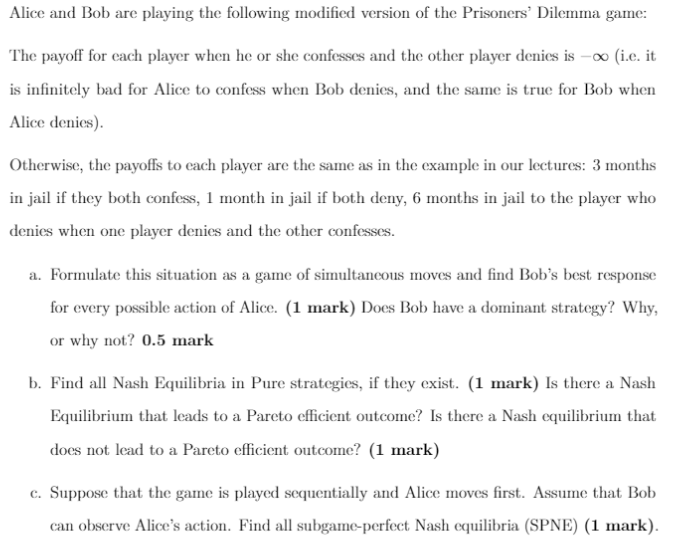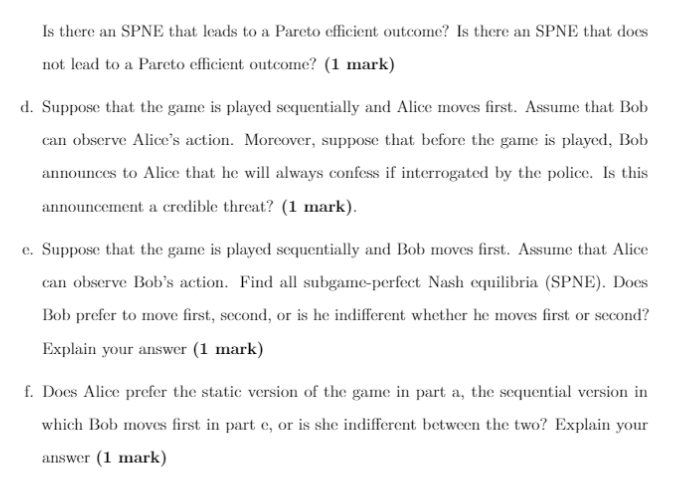

Alice and Bob are playing the following modified version of the Prisoners' Dilemma game: The payoff for each player when he or she confesses and the other player denies is - i.e. it is infinitely bad for Alice to confess when Bob denies, and the same is true for Bob when Alice denies). Otherwise, the payoffs to each player are the same as in the example in our lectures: 3 months in jail if they both confess, 1 month in jail if both deny, 6 months in jail to the player who denies when one player denies and the other confesses. a. Formulate this situation as a game of simultaneous moves and find Bob's best response for every possible action of Alice. (1 mark) Does Bob have a dominant strategy? Why, or why not? 0.5 mark b. Find all Nash Equilibria in Pure strategies, if they exist. (1 mark) Is there a Nash Equilibrium that leads to a Pareto efficient outcome? Is there a Nash equilibrium that does not lead to a Pareto efficient outcome? (1 mark) c. Suppose that the game is played sequentially and Alice moves first. Assume that Bob can observe Alice's action. Find all subgame-perfect Nash equilibria (SPNE) (1 mark). Is there an SPNE that leads to a Pareto efficient outcome? Is there an SPNE that does not lead to a Pareto efficient outcome? (1 mark) d. Suppose that the game is played sequentially and Alice moves first. Assume that Bob can observe Alice's action. Moreover, suppose that before the game is played, Bob announces to Alice that he will always confess if interrogated by the police. Is this announcement a credible threat? (1 mark). e. Suppose that the game is played sequentially and Bob moves first. Assume that Alice can observe Bob's action. Find all subgame-perfect Nash equilibria (SPNE). Does Bob prefer to move first, second, or is he indifferent whether he moves first or second? Explain your answer (1 mark) f. Does Alice prefer the static version of the game in part a, the sequential version in which Bob moves first in part e, or is she indifferent between the two? Explain your answer (1 mark) Alice and Bob are playing the following modified version of the Prisoners' Dilemma game: The payoff for each player when he or she confesses and the other player denies is - i.e. it is infinitely bad for Alice to confess when Bob denies, and the same is true for Bob when Alice denies). Otherwise, the payoffs to each player are the same as in the example in our lectures: 3 months in jail if they both confess, 1 month in jail if both deny, 6 months in jail to the player who denies when one player denies and the other confesses. a. Formulate this situation as a game of simultaneous moves and find Bob's best response for every possible action of Alice. (1 mark) Does Bob have a dominant strategy? Why, or why not? 0.5 mark b. Find all Nash Equilibria in Pure strategies, if they exist. (1 mark) Is there a Nash Equilibrium that leads to a Pareto efficient outcome? Is there a Nash equilibrium that does not lead to a Pareto efficient outcome? (1 mark) c. Suppose that the game is played sequentially and Alice moves first. Assume that Bob can observe Alice's action. Find all subgame-perfect Nash equilibria (SPNE) (1 mark). Is there an SPNE that leads to a Pareto efficient outcome? Is there an SPNE that does not lead to a Pareto efficient outcome? (1 mark) d. Suppose that the game is played sequentially and Alice moves first. Assume that Bob can observe Alice's action. Moreover, suppose that before the game is played, Bob announces to Alice that he will always confess if interrogated by the police. Is this announcement a credible threat? (1 mark). e. Suppose that the game is played sequentially and Bob moves first. Assume that Alice can observe Bob's action. Find all subgame-perfect Nash equilibria (SPNE). Does Bob prefer to move first, second, or is he indifferent whether he moves first or second? Explain your answer (1 mark) f. Does Alice prefer the static version of the game in part a, the sequential version in which Bob moves first in part e, or is she indifferent between the two? Explain your answer (1 mark)








